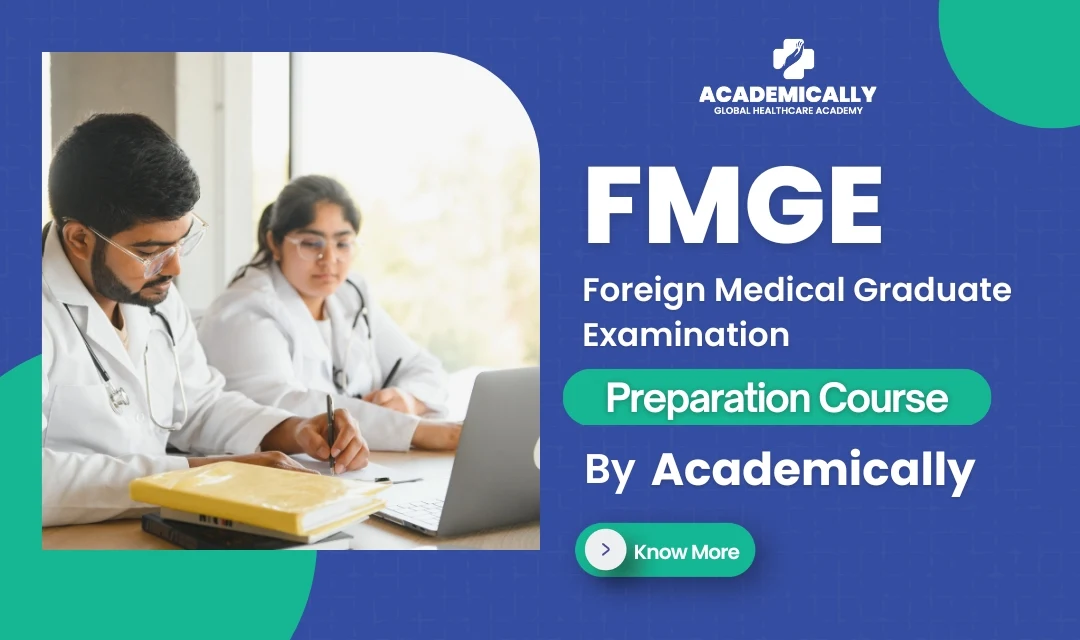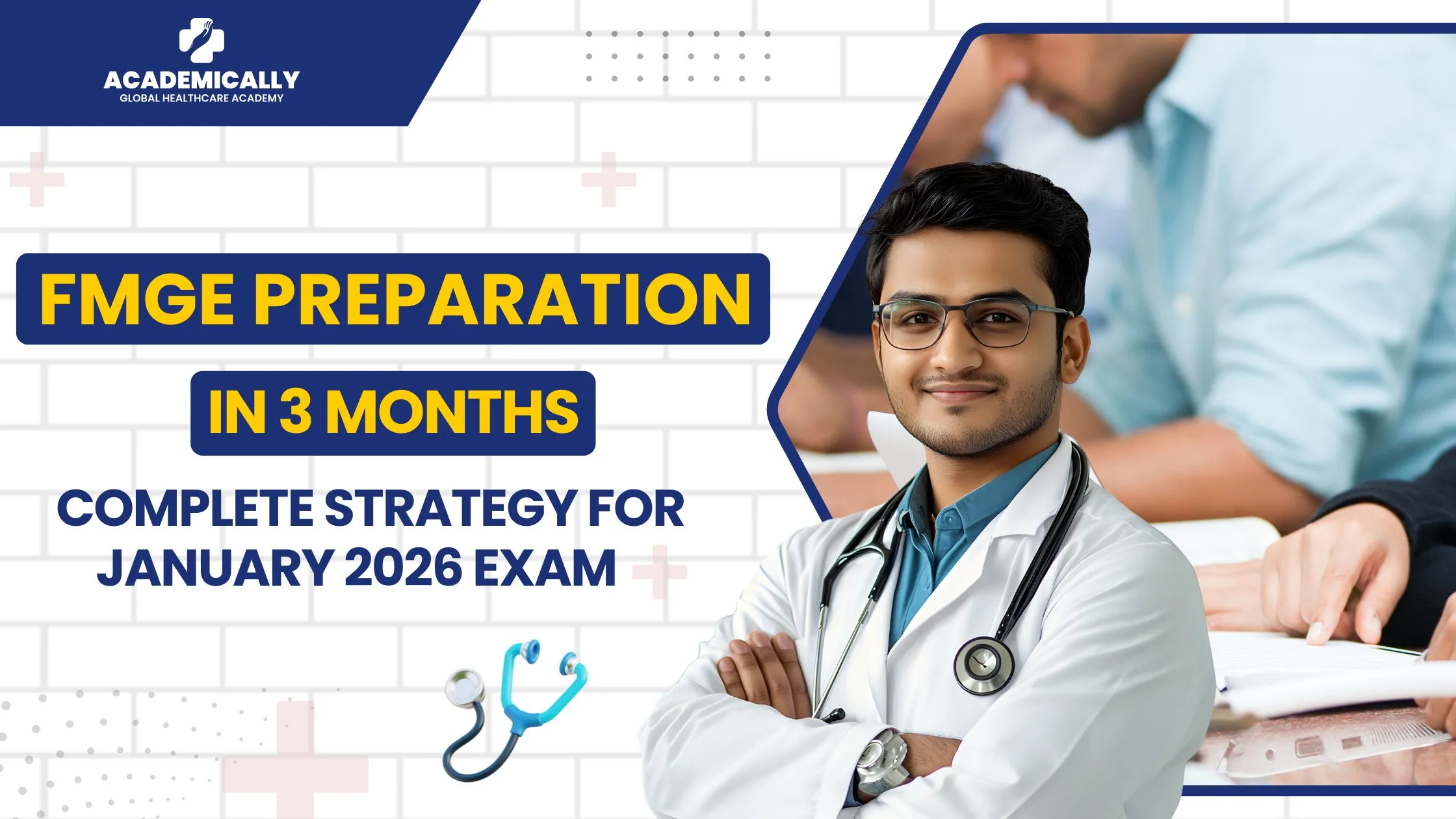Cracking the FMGE in three months might sound like a caffeine-fueled fantasy, but it’s doable. Thousands of foreign medical graduates have pulled it off, and with the right plan, you can too.
If you’re reading this, you’ve probably already realized that the January 2026 exam isn’t going to wait for you to “feel ready.” It’s time to stop panicking and start planning.
What is FMGE and Why It Matters
The Foreign Medical Graduate Examination (FMGE) is conducted by the National Board of Examinations in Medical Sciences (NBEMS) for Indian citizens who have earned their MBBS degree abroad. Passing the FMGE is mandatory to obtain permanent registration with the National Medical Commission (NMC), which allows you to practice medicine in India legally.
Here’s a quick snapshot of the exam:
- Format: 300 multiple-choice questions
- Duration: 2 sessions in a single day
- Passing Marks: 150/300
- Negative Marking: None
The exam covers all the core medical subjects taught during your MBBS, which means you’re expected to have a strong grasp of basic sciences and clinical knowledge. It’s not just about rote memorization it’s about recall under pressure.
Why a 3-Month Plan Can Work
Three months is tight, but it’s not impossible. Think of it as an intensive bootcamp:
- You already have your MBBS foundation.
- You only need to focus on high-yield topics.
- Smart, consistent preparation beats long, aimless reading.
The key is discipline, structured revision, and MCQ practice. Let’s break it down month by month.
Month 1: Foundation and Familiarity
The first month is all about understanding the landscape. Don’t try to memorize everything; focus on clarity and structure.
Step 1: Gather the Right Resources
Too many resources can overwhelm you. Stick to 1–2 trusted materials per subject, such as:
- Academically’s notes by FMGE experts
- Past Years’ FMGE Question Banks
Step 2: Focus on High-Weightage Subjects
The FMGE is predictable. Some subjects are tested more heavily than others:
- PSM (Preventive and Social Medicine)
- Medicine & Pediatrics
- Surgery
- Obs & Gynae
- Pharmacology, Pathology, Microbiology
- Forensic, ENT, Ophthalmology, etc.
Allocate more time to the first five subjects and touch on the rest lightly.
Step 3: Make a Daily Schedule
A sample day in month 1:
| Time | Activity |
| 6:00–7:00 AM | Quick revision of yesterday’s topics |
| 7:00–9:00 AM | Medicine (concept review) |
| 9:00–10:00 AM | Break / Breakfast |
| 10:00–1:00 PM | Surgery & Obs-Gynae |
| 1:00–2:00 PM | Lunch & Rest |
| 2:00–4:00 PM | PSM / Pharmacology |
| 4:00–6:00 PM | MCQ Practice |
| 6:00–7:00 PM | Dinner / Short break |
| 7:00–9:00 PM | Revision of weak topics |
| 9:00–10:00 PM | Light reading / Charts / Sleep preparation |
Step 4: Start Light MCQ Practice
Don’t overwhelm yourself. Solve 50–100 MCQs daily from past papers to get used to the exam style.
Month 2: Intensive Practice and Mock Tests
By month 2, your foundation should be strong. Now it’s time to intensify your preparation and start simulating real exam conditions.
Step 1: Mock Tests are Your New Best Friend
- Take 1 full-length mock test every 3–4 days.
- Treat it like the real FMGE: timed, silent, no distractions.
- Analyze every wrong answer, understanding mistakes is where most marks are gained.
Step 2: Focus on Weak Areas
- Identify subjects/topics where you score <50% in mock tests.
- Spend extra time revising those.
- Use mnemonics, diagrams, and flowcharts to make recall easier.
Step 3: Revision is Constant
- Use the “1-2-3 method”:
- Revise yesterday’s topics in 10–15 minutes.
- Revise last week’s topics over the weekend.
- Revise one past month’s topic every alternate day.
Step 4: Don’t Ignore Image-Based Questions
FMGE loves radiographs, histology slides, and ECGs.
- Practice image-based MCQs daily.
- Use online FMGE prep apps to simulate visuals.

Month 3: Mastery, Recall, and Final Revision
Now it’s game time. Month 3 is about maximizing recall and consolidating everything you’ve studied.
Step 1: Full-Length Mock Tests Every 2–3 Days
- Simulate exam conditions exactly.
- Review wrong answers immediately.
- Track progress subject-wise.
Step 2: Rapid Revision of All 19 Subjects
- Use short notes, high-yield charts, and mnemonics.
- Spend more time on volatile subjects: Biochemistry, Microbiology, Pharmacology.
Step 3: Last 10 Days – No New Topics
- Only revise. No new chapters.
- Focus on recall techniques: self-quizzing, flashcards, and rapid-fire MCQs.
Step 4: Sleep, Nutrition, and Mental Preparation
- Don’t sabotage yourself with late-night cramming.
- 7–8 hours of sleep helps memory consolidation.
- Stay hydrated and eat light, brain-friendly meals.
Tips from Top Scorers
- Revise, Don’t Reread – repetition beats reading for the first time.
- Simulate Exam Conditions – pressure improves recall.
- Mnemonics Are Lifesavers – especially for lists and drug names.
- Trust the Plan – panic is normal; consistency is rare.
- Stay Positive – self-doubt kills scores faster than forgetting a drug dose.





